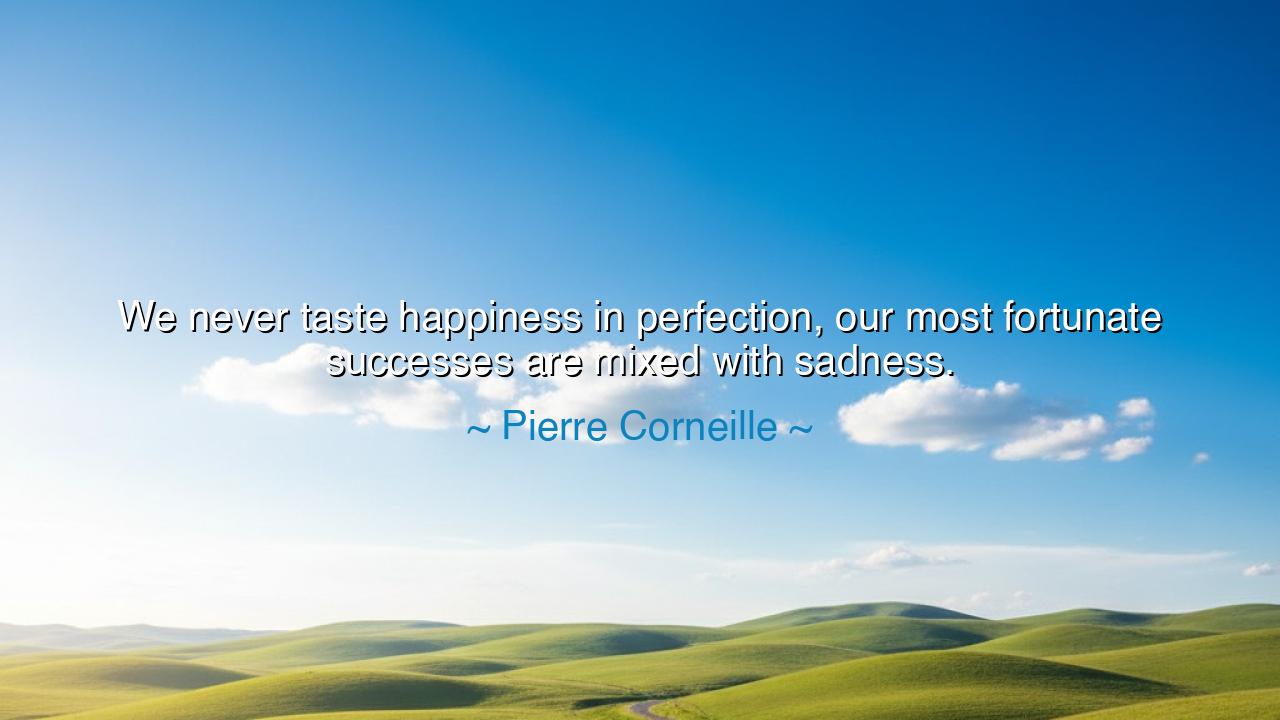
We never taste happiness in perfection, our most fortunate
We never taste happiness in perfection, our most fortunate successes are mixed with sadness.






The words of Pierre Corneille, “We never taste happiness in perfection, our most fortunate successes are mixed with sadness,” ring with the quiet majesty of truth, drawn from the deep well of human experience. They speak to the eternal paradox of life—that happiness and sorrow are not enemies, but companions; that every joy we grasp carries within it the shadow of loss. Corneille, the great dramatist of seventeenth-century France, was no stranger to the complexities of the human heart. His plays revealed men and women torn between duty and desire, victory and sacrifice. In this quote, he unveils one of the oldest truths of existence: that perfection in joy is denied to mortal beings. Even in our brightest moments, the heart feels the echo of impermanence, and the soul, aware of time’s passing, weaves melancholy into triumph.
To understand these words is to understand the nature of happiness itself. Perfect happiness—complete, unmixed, eternal—is not given to mankind. The ancients, from the Stoics to the sages of the East, understood this truth well. The philosopher Seneca once said that the wise man accepts fortune as a sailor accepts the sea—with its calms and tempests alike. For joy, like the sea, cannot be held still. It rises and falls, shimmering for a moment before dissolving into sorrow or reflection. Corneille’s insight reminds us that the finest successes in life—those moments we dream of and strive for—are always tempered by something bittersweet. We reach the summit of the mountain, only to look down and see the road we’ve left behind, the companions we’ve lost, the sacrifices that made our ascent possible.
Corneille himself lived in an age of both grandeur and fragility. France was awakening to glory under Louis XIII and Cardinal Richelieu, and yet the price of that splendor was blood, betrayal, and restlessness of spirit. As a dramatist, Corneille witnessed men achieve greatness through sacrifice—heroes who conquered, yet mourned; lovers who triumphed, yet wept. His words are not of despair, but of understanding. He teaches that the heart of man is made to feel deeply, and thus even happiness carries the sting of awareness. When we succeed, we recall the struggles that brought us there; when we rejoice, we remember that such moments cannot last. The soul, wise and restless, perceives that joy and sorrow are threads woven from the same fabric of being.
Consider the story of Alexander the Great, who, after conquering the known world, stood before his armies and wept. When asked why, he said, “There are no more worlds to conquer.” His victory—his most fortunate success—was laced with sadness. For what is triumph without purpose beyond it? What is glory if it ends in emptiness? This is the truth of Corneille’s words: that every joy contains within it a reminder of its own transience. When love is found, there is the fear of losing it; when dreams are fulfilled, there is the longing for something new. The human heart, vast as it is, can never be satisfied with permanence—it beats within the rhythm of both laughter and lament.
Yet, this mingling of happiness and sorrow is not a curse, but a gift. For if happiness were perfect, it would be motionless—and without contrast, joy would lose its meaning. The fleeting nature of happiness is what gives it its sweetness. The sorrow that lingers beside it deepens its flavor, much as shadow deepens the beauty of light. The wise do not seek perfect happiness, for they know it cannot be found in this world; instead, they learn to cherish imperfection—to see beauty in the broken, hope in the fleeting, and joy in the midst of struggle. To feel both pain and pleasure is to be fully alive.
In this way, Corneille’s insight is not one of resignation, but of acceptance and maturity. He speaks to those who have lived long enough to see that the heart cannot remain in pure delight. To live is to balance on the edge between joy and sorrow, between victory and loss. The mature soul learns to embrace both—to celebrate happiness without clinging to it, and to endure sadness without despair. This is the wisdom of harmony: to walk through life with open eyes and a grateful heart, knowing that even the shadow of sorrow gives shape to the light of joy.
Let this be your lesson, then, O listener: do not seek happiness without sorrow, for it does not exist. When success comes, receive it with humility; when loss follows, accept it with grace. Do not curse the tears that accompany your triumph—they are proof that your joy was real, that your heart was alive enough to feel both ends of existence. Strive not for perfection, but for depth; not for endless delight, but for meaningful moments. For the man who can say, “My happiness was mixed with sadness, and yet it was mine,” is wiser and richer than the one who demands eternal joy and finds none.
Thus, the ancient truth endures: happiness in perfection is not for mortals, but for the gods. Yet in our imperfect joy—in our mingled laughter and tears—we discover something greater than perfection: the full measure of the human soul. And when you stand at the height of your success, and feel both pride and sorrow within you, remember Corneille’s words, and know that you are not broken—you are complete.






AAdministratorAdministrator
Welcome, honored guests. Please leave a comment, we will respond soon